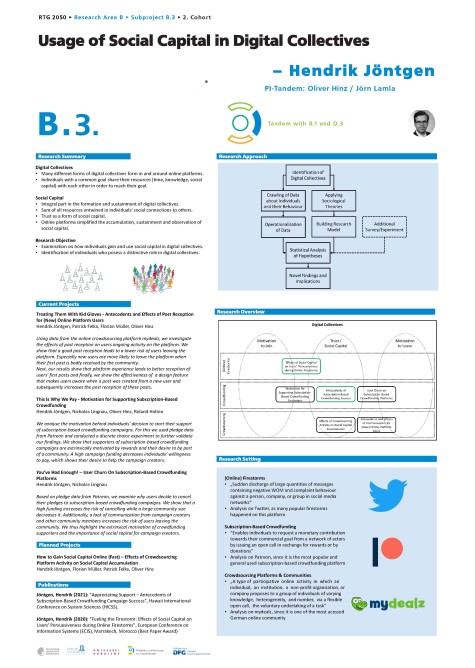Subarea B.3 addresses the genesis and use of social capital on crowd platforms. Among other things, it has already been demonstrated how social media users can build and use social capital as a measure of trust on their respective platforms. Furthermore, it was investigated how digital footprint data allows to measure the strength of real connections between individuals. Based on this, it was possible to show how trust emerges in the context of digital collectives and influences them. The focus for this was on (online) firestorms, subscription-based crowdfunding campaigns and crowdsourcing communities. In addition, it was demonstrated that social capital can also be transformed into economic capital through subscription-based crowdfunding. As algorithms are of growing importance in the context of digital platforms, current research focuses on the extent to which the interaction between algorithms and users influences perceptions of privacy and trust, and which effects emerge. As an example, algorithms influence recommendation systems on the one hand, and the continuous radicalization through filter bubbles in the context of fake news and conspiracy theories on the other.
Current PhD project of subarea B.3:
The Influence of Algorithms on User Behaviour
-Rebecca Heigl-
Ubiquitous application of algorithmic recommendation systems facilitate worldwide policy advances. In this context, it is important to examine in more detail how privacy is functionalized for the formation of trust by means of these very procedures or, conversely, how algorithmically secured platform trust changes the parameters of private lifestyles.
The goal is to explore how privacy and trust in hybrid constellations and in the interaction between AI and human intelligence are variously set in relation to each other and thereby mutually stabilize and modify each other. One parameter that has not been researched is the influence of reciprocal relationships: Content and interfaces continuously adapt to their users by observing and recording their behaviour and using it as training data. The goal of my project is threefold: First, I would like to explore the mental models of users while being in this recursive relationship with platforms. Are users aware of the connection between accuracy and trust and are they willing to disclose more data to improve the accuracy of the algorithm? Is this a conscious and unconscious mechanism? What are the underlying mechanisms for the information processing in algorithmic contexts? How do they relate to opinion formation in algorithmic contexts. Second, I want to shed light on transparency mechanisms that enhance both trust and privacy in those contexts. What tools and training can be provided? What can platform owners do to increase trust?
To consolidate and synthesize my findings, I plan to compile a cumulative thesis that holistically intertwines the above mentioned research questions. Foremost, quantitative experiments will be my area of focus, but qualitative studies are also planned. By combining both approaches, I aim to provide a well-rounded understanding of the subject matter and offer valuable insights into the intricate dynamics of privacy, trust, and transparency in human-AI interactions.
| Name | Working area(s) | Contact | |
|---|---|---|---|

| Prof. Dr. Oliver Hinz | B.3, A.2 | hinz@wiwi.uni-frankfurt.de +49 69 798 34675 |

| Rebecca Heigl | B.3, Tandem: B.1, D.3 | rmheigl@wiwi.uni-frankfurt.de |
Previous PhD project of subarea B.3:
Usage of Social Capital in Digital Collectives
-Hendrik Jöntgen-
The focus in this research project of B.3 lies on the use of social capital in so-called “Digital Collectives”. A Digital Collective is a collective of social network users who temporarily work together and share their resources with each other in order to achieve a common goal. Examples for them are (online) firestorms, subscription-based crowdfunding campaigns and crowdsourcing communities.
In order to investigate the effects of social capital on firestorms we gather Tweets from past firestorms to simulate and analyze the social network of their participants. As an enhancement for this study, we conduct a survey regarding the motivation to join a firestorm. Based on this approach we can observe the effects of social capital on the development of firestorms.
A similar approach is taken for subscription-based crowdfunding campaigns and crowdsourcing communities. Based on crawled data from Patreon and mydealz, we analyze the motivations for individuals to join these digital collectives and participate in them.
Finally, we combine our insights about the use of social capital in these digital collective to get a better understanding about social capital and its benefits in social media networks.
| Name | Working area(s) | Contact | |
|---|---|---|---|

| Prof. Dr. Oliver Hinz | B.3, A.2 | hinz@wiwi.uni-frankfurt.de +49 69 798 34675 |

| Hendrik Jöntgen | B.3, Tandem: B.1, D.3 | joentgen@wiwi.uni-frankfurt.de +49 69 798 34724 |






